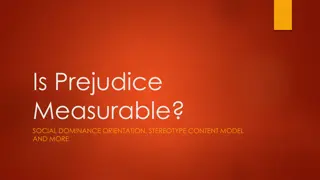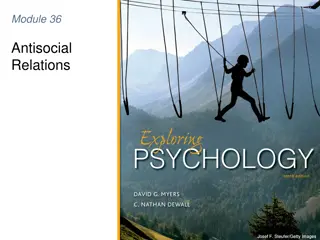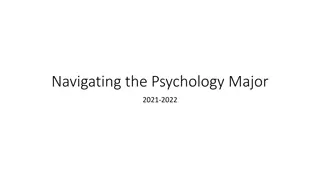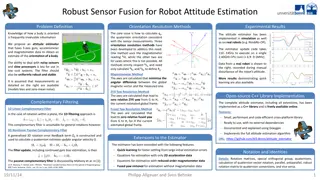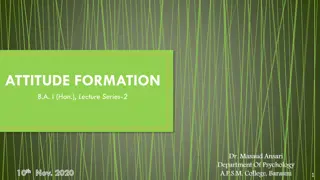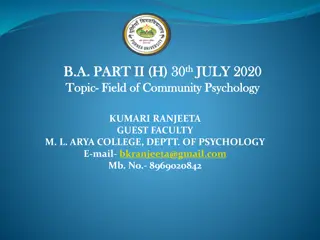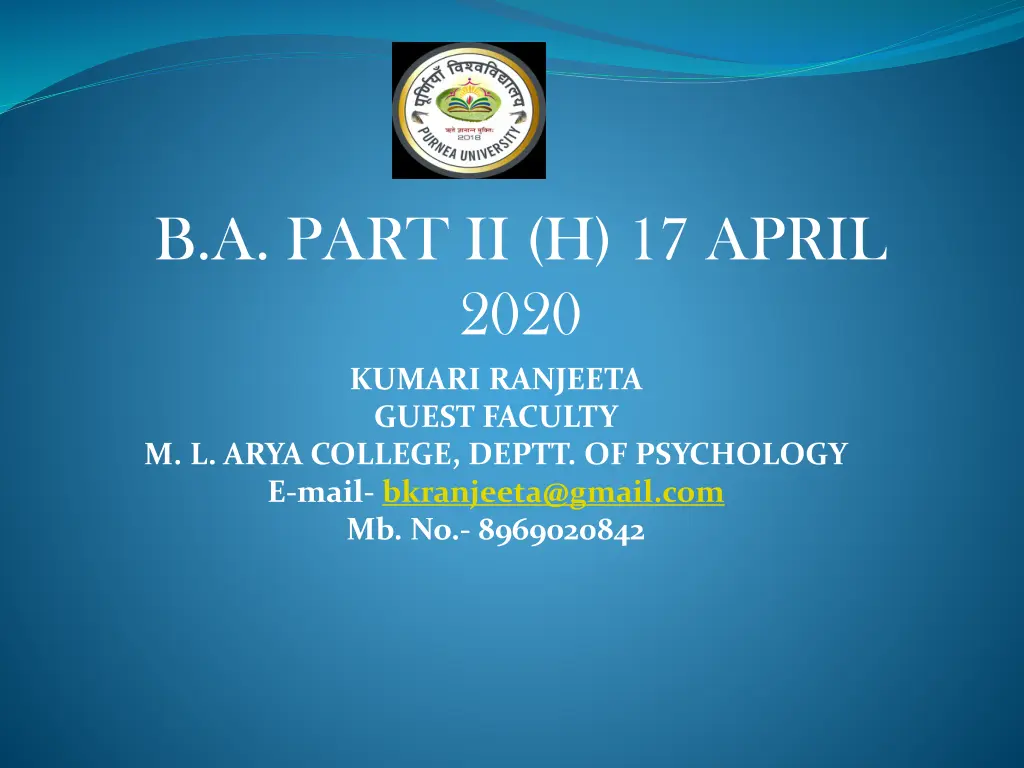
Understanding Attitude and Prejudice in Psychology
Explore the concepts of attitude and prejudice in psychology, understanding their differences and influences on behavior. Learn how attitudes can shape personality and decision-making, and how prejudices can lead to unjustified conclusions about individuals based on social group membership.
Download Presentation

Please find below an Image/Link to download the presentation.
The content on the website is provided AS IS for your information and personal use only. It may not be sold, licensed, or shared on other websites without obtaining consent from the author. If you encounter any issues during the download, it is possible that the publisher has removed the file from their server.
You are allowed to download the files provided on this website for personal or commercial use, subject to the condition that they are used lawfully. All files are the property of their respective owners.
The content on the website is provided AS IS for your information and personal use only. It may not be sold, licensed, or shared on other websites without obtaining consent from the author.
E N D
Presentation Transcript
B.A. PART II (H) 17 APRIL 2020 KUMARI RANJEETA GUEST FACULTY M. L. ARYA COLLEGE, DEPTT. OF PSYCHOLOGY E-mail- bkranjeeta@gmail.com Mb. No.- 8969020842
17 APRIL 2020 B.A. PART II (H) PAPER IV, UNIT IV, ATTITUDE ATTITUDE AND PREJUDICE Prejudice is an unjustified or incorrect attitude (usually negative) towards an individual based solely on the individual s membership of a social group. For example, a person may hold prejudiced views towards a certain race or gender etc. (e.g. sexist). For ages people have been finding the difference between attitude and prejudice as both these are feelings of human beings and are expressions that are easily confused.
17 APRIL 2020 B.A. PART II (H) PAPER IV, UNIT IV, ATTITUDE Attitude is common in all human beings. People have both positive and negative attitudes towards different things. Attitudes could be in favor of something or not in favor something. And, on the other hand, prejudice is a prejudgment of something without really knowing the facts or having exposed to the reality of a situation. Prejudice is always an adverse conclusion about somebody. However, the fact remains that both attitudes and prejudices can be seen in almost every person. Prominent psychologist Gordon Allport described attitudes as the most distinctive and indispensable concept in contemporary social psychology .
17 APRIL 2020 B.A. PART II (H) PAPER IV, UNIT IV, ATTITUDE Attitude forms an important part of our personality and the way we think is a very important element in creating the kind of life we want to live. Attitude are often the result of experience and also upbringing. They have a powerful influence over behavior. The fact is that while attitudes have lasting effect, they can be changed. Most humans make their decisions in life based on their attitudes. Attitude gets formed on some sort of beliefs as well. It also depends on parameters such as grasp, intelligence, broadmindedness, in short how a person sees and understands a certain phenomenon.
17 APRIL 2020 B.A. PART II (H) PAPER IV, UNIT IV, ATTITUDE Attitude can be either negative or positive. Also, a negative attitude can be turned to a positive attitude and vice versa. It has been found that there are two types of attitudes in humans. They are explicit attitudes and implicit attitudes. Explicit attitudes are deliberately formed ones. That means a person has developed an attitude towards something being really aware of that. An implicit attitude, on the other hand, is formed by an individual subconsciously. A person may not be aware of the attitude formed in him/her. However, attitudes are an important phenomenon in all individuals lives because attitudes control people s behavior and thought patterns. Moreover, there are group attitudes that are shared by a particular group of people.
17 APRIL 2020 B.A. PART II (H) PAPER IV, UNIT IV, ATTITUDE It can be said that all the relationships that exist among humans are based on an attitude structure. Further, different individuals may share different attitudes towards a similar phenomenon. One may have a positive attitude regarding a certain thing whereas another person may perceive the same thing in a negative manner. Prejudice is defined as forming of a negative attitude towards a person without having a full realization of facts. That is like making a prejudgment. There can be prejudices over age, social class, ethnicity, race, culture, family background, education, looks and so many other things.
17 APRIL 2020 B.A. PART II (H) PAPER IV, UNIT IV, ATTITUDE The evident thing about prejudice is that a person does not look deep into the phenomenon before making a conclusion. Somebody can have a prejudice over a person or a particular group of people, based on a misapprehension or misunderstandings because of ignorance. Prejudice is always a negative situation which should be avoided as far as possible by people. In conclusion, when we take both attitude and prejudice, we can identify that both are human feelings towards something. Attitude can be aimed at a person, an object, a place or may be a situation whereas prejudice aims at a person or a group of people.
17 APRIL 2020 B.A. PART II (H) PAPER IV, UNIT IV, ATTITUDE Attitude can both be positive or negative but prejudice is always a negative phenomenon. Attitudes are formed after a full investigation of a particular fact whereas prejudice is based on prejudgment. And lastly, prejudice can also be considered as an attitude that is not formed through an experience of the facts. Both attitudes as well as prejudice may change over the time and they are not permanent ideologies.

